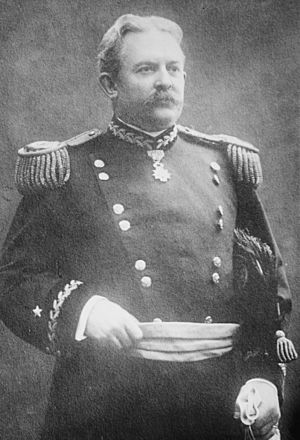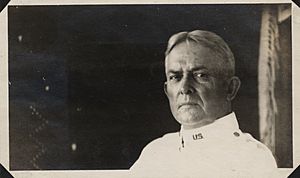J. Franklin Bell facts for kids
Quick facts for kids
James Franklin Bell
|
|
|---|---|
 |
|
| Born | January 9, 1856 Shelbyville, Kentucky, US |
| Died | January 8, 1919 (aged 62) New York City, US |
| Allegiance | United States |
| Service/ |
United States Army |
| Years of service | 1878–1919 |
| Rank | Major General |
| Commands held | Chief of Staff of the United States Army Philippine Department Department of the East 77th Infantry Division |
| Battles/wars | Indian Wars
Philippine–American War World War I |
| Awards | Medal of Honor Distinguished Service Cross Distinguished Service Medal |
| Signature | |
James Franklin Bell (born January 9, 1856 – died January 8, 1919) was an important officer in the United States Army. He served as the Chief of Staff of the United States Army from 1906 to 1910. This was a very high-ranking job, like being the top leader of the entire army!
Bell was a major general in the regular U.S. Army. At the time of his death in 1919, he was in charge of the Department of the East, with his main office in Governors Island, New York. He joined the West Point in 1874. He graduated in 1878 as a second lieutenant in the 9th Cavalry Regiment.
Contents
Growing Up: James Franklin Bell's Early Life
Bell was born in Shelbyville, Kentucky. His parents were John Wilson and Sarah Margaret Venable (Allen) Bell. Sadly, his mother passed away when he was young.
During the American Civil War, his home county was divided. Some people supported the Union, and others supported the Confederacy. Young James Franklin, who friends called "Frank," grew up on his father's farm.
He went to public schools in Shelbyville. Until he was sixteen, he worked on the farm six days a week. This hard work made him very strong and healthy. In 1872, he started working as a clerk in his uncle's general store. He loved playing baseball and watching horse races.
Working in a store wasn't exciting enough for Frank. In 1874, he got the chance to go to West Point, a famous military school. He was good at art and riding horses. He graduated in 1878. The army first assigned him to the 9th Cavalry. Later, he was assigned to the all-white 7th Cavalry. He joined this unit in Dakota Territory on October 1, 1878.
Serving in the Indian Wars
From 1886 to 1889, Bell worked as an instructor at Southern Illinois University. He taught military science, tactics, and math. While there, he also studied law and became a lawyer in Illinois.
In 1889, he went back to the 7th Cavalry. He was promoted to first lieutenant on December 29, 1890. He took part in the Pine Ridge, South Dakota campaign in 1891.
Later that year, his unit moved to Fort Riley, Kansas. Bell joined the staff of the Cavalry and Light Artillery School. He quickly became an important leader there. In 1894, Bell became an aide to General James W. Forsyth. He moved to California, then Arizona, and finally to Vancouver Barracks, Washington, in 1898.
Fighting in the Spanish–American War
When the Spanish–American War began, Bell was working for General Forsyth in San Francisco. He was quickly made a Colonel of Volunteers. He was put in charge of organizing a new regiment.
This regiment was sent to the Philippines. There, Bell and his soldiers fought in the Philippine–American War. After only a few months, Bell was promoted from captain to brigadier general in the regular army. This was a big jump in rank!
Bell received the Medal of Honor for his bravery. On September 9, 1899, near Porac on Luzon Island in the Philippines, he showed amazing courage. He was ahead of his regiment when he charged seven enemy fighters with his pistol. He made their captain and two soldiers surrender, even while others were shooting at him from a bamboo forest.
Important Roles in America
In July 1903, Bell moved to Fort Leavenworth, Kansas. He became the head of the Command and General Staff School. He led this important school until April 1906.
Then, Bell was promoted to major general and became the Chief of the Army General Staff. He held this top position for four years, working with Presidents Theodore Roosevelt and William Howard Taft. Bell was the first army chief in 45 years who had not fought in the American Civil War.
In 1911, he returned to Manila in the Philippines as the military commander. But when war with Mexico seemed likely, he was called back home. He was given command of the 4th Division. This division stayed in Texas City as a backup force. Even though it seemed like he might go to Mexico, he never did.
After things calmed down with Mexico, Bell was put in charge of the Department of the West in San Francisco. He stayed there until the United States joined World War I.
In early 1917, Bell was moved to the Department of the East in New York City. He was in charge of the Officers' Training Camps. These camps trained many new officers for the army. Bell's aide, Captain George C. Marshall, helped a lot with getting supplies for these camps. In August 1917, these camps trained many new officers needed for the new National Army.
In the same month, Bell took command of the 77th Division. This division was made up mostly of soldiers from New York state. Its symbol was the Statue of Liberty. Bell led the division as new officers arrived and barracks were quickly built. In December, he traveled to France to see the war firsthand. He returned in March 1918.
When he came back, Bell couldn't pass the physical exam needed to serve overseas. So, he couldn't lead the 77th Division in France. Instead, he was again given command of the Department of the East. He stayed at his old headquarters on Governors Island until he passed away in January 1919.
Awards and Honors
- Medal of Honor
- Distinguished Service Cross
- Distinguished Service Medal
- Indian Campaign Medal
- Spanish Campaign Medal
- Philippine Campaign Medal
- Mexican Border Service Medal
- World War I Victory Medal
Promotions and Ranks
![]() United States Military Academy Cadet – class of 1878
United States Military Academy Cadet – class of 1878
| Rank | Date | Type of Army |
|---|---|---|
| June 1878 | Regular Army | |
| December 29, 1890 | Regular Army | |
| May 17, 1898 | Volunteers | |
| March 2, 1899 | Regular Army | |
| July 5, 1899 | Volunteers | |
| December 1899 | Volunteers | |
| February 19, 1901 | Regular Army | |
| January 3, 1907 | Regular Army |
 | John T. Biggers |
 | Thomas Blackshear |
 | Mark Bradford |
 | Beverly Buchanan |


